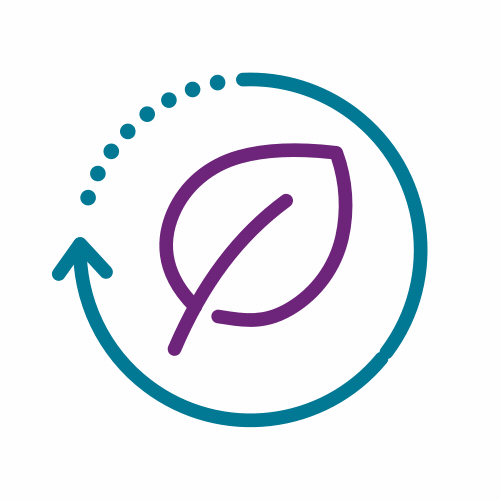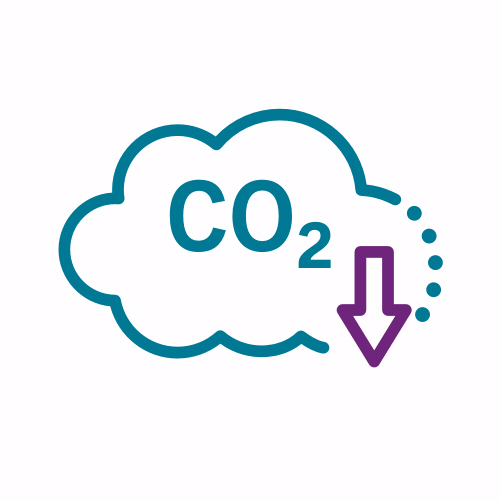
Campuses & Operations
From energy to buildings and grounds management to food and waste services, the U of T community is taking bold steps to ensure our operational activities contribute to academic learning, research and environmental and human well-being.
We are designing and delivering novel solutions to make our university more sustainable, climate positive and a living laboratory of ideas that benefit society and accelerate action.

Canada’s largest urban geoexchange system

Among Canada’s Greenest Employers

Climate Positive on all three campuses by 2050
- 45,000 tonnes of GHG emissions cut by 2027 through Project Leap
- 6,900 tonnes of GHG emissions cut by 2030 at UTSC through Energy Conservation and Demand Management Plan, 2024-2029
- 6,000 tonnes GHG emissions cut through retrofits at UTM through Project SHIFT

Growth. Renewal. Resiliency.
Discover how U of T is transforming its infrastructure and energy systems to cut absolute emissions by at least 80 per cent and achieve a climate positive campus in the heart of Canada’s largest city by 2050.
Campus as a Living Lab
Using U of T’s campuses as test beds for innovation, faculty, staff, students and external partners are working together to design and develop sustainability solutions that address real-world challenges.

Campus Management
On campus sustainability is managed by stewards in the Sustainability Offices at each of our St. George, Mississauga and Scarborough campuses.
Facilities & Services

Social and Sustainable Procurement
Every purchase at U of T has a social, economic, cultural and environmental impact. Through social procurement (providing typically underrepresented suppliers who may not be aware of or approached for potential business opportunities), the university can leverage existing procurement activities to achieve positive social value outcomes.

Sustainable Change Programs
These programs aim to engage and empower U of T students, staff and faculty to actively follow sustainable practices in offices, residences, event planning, labs and courses across campus through a self-assessment certification process.

Scope 3 Emissions
Scope 3 emissions are indirect emissions that occur in the value chain of the organization, such as emissions associated with travel, purchased goods and services and digital footprint. They are the most difficult emissions to account for, measure and reduce as they are not owned or operated by the university. According to the Climate Positive Energy Initiative, scope 3 emissions may contribute as much as 90 per cent of the total emissions from post-secondary institutions.

Offsetting U of T Air Travel Emissions
U of T offsets emissions for business air travel by investing in university-based projects aimed at reducing the institution’s carbon footprint.

Carbon Reduction Fund
The Carbon Reduction Fund finances greenhouse gas (GHG) emissions reduction projects across U of T. Rather than purchasing carbon offsets from external providers, the fund directly supports the university’s emissions reduction efforts.
Food Systems & Farming
U of T Food Services
Trinity Food Systems Lab
Hart House Farm
UTSC Campus Farm
Culinaria Research Centre

Staff Sustainability Training
This staff sustainability training was co-created by the President’s Advisory Committee on the Environment, Climate Change, and Sustainability (CECCS), the tri-campus Sustainability Offices, the Office of Indigenous Initiatives and the Division of People, Strategy, Equity & Culture (PSEC). It includes two separate components:
1. Understanding Sustainability Goals at the University of Toronto
This one-hour online learning module will familiarize staff with the UN Sustainable Development Goals (SDGs), some of the ways the University of Toronto is advancing them and the connection between sustainability, EDI and Truth & Reconciliation initiatives at U of T.
Learning outcomes:
- Familiarize staff with the United Nation Sustainable Development Goals (SDGs)
- Understand the connection between sustainability and equity, diversity and inclusion (EDI)
- Learn about U of T sustainability, EDI, and Truth & Reconciliation initiatives
Upon successful completion of the online module, staff can register for Integrating Sustainability Goals in our Workplaces at U of T.
2. Integrating Sustainability Goals in our Workplaces at U of T
This course will explore strategies for staff to participate in and advance sustainability within their individual capacities as U of T staff members. Staff members will be given the opportunity to engage, strategize and share ideas with other U of T staff and will be provided with resources to empower them to implement their ideas.
Learning outcomes:
- Empower staff to advance sustainability in their workplaces
- Raise awareness of existing sustainability resources and programs
- Build a community of staff sustainability champions across U of T

Co-Chairs
Co-Chairs
Marianne Hatzopoulou (Co-Chair)
Professor and Chair, Department of Civil & Mineral Engineering; Director, Positive Zero Transport Futures
Ahmed Azhari (Co-Chair)
Managing Director, Operations, Sustainability & Asset Management, UTM
Catherine Thorn (Co-Chair) (on leave)
Director, Sustainability & Energy Management, Facilities & Services
Members
Members
Beverley Ayeni
Senior Manager, Sustainability and Energy Management, UTM
Maureen Beckett
Project Manager, University Planning, Design & Construction
Roger Bulgin
Chief Administrative Officer, Woodsworth; Arts & Science
Kenneth Corts
Vice-Dean, Research, Strategy, and Resources; Academic Director, Lee-Chin Institute for Corporate Citizenship; Desautels Chair in Entrepreneurship; Professor, Rotman School of Management
Patricia Escobar
Sustainability Manager, UTSC
Scott Hendershot
Senior Manager, Sustainability Office, UTSG
Sarah Hinves
Senior Planner, Infrastructure Planning; Arts & Science
Jeffrey Miller
Director, Facilities Management & Capital Projects, UTSC
Shoshanna Saxe
Associate Professor, Department of Civil and Mineral Engineering
Nicole Spiegelaar
Assistant Professor, Teaching Steam, School of the Environment; Academic Director, Trinity’s Integrated Sustainability Initiative; Arts & Science
Dione Dias
Project Manager
CECCS Operations Subcommittee
The Operations Subcommittee, a part of the President’s Advisory Committee on the Environment, Climate Change, and Sustainability (CECCS), brings the university community together to collaborate on signature sustainability projects with operational and academic activities, including Campus as a Living Lab projects. It also works on tri-campus operational collaboration and coordination.



